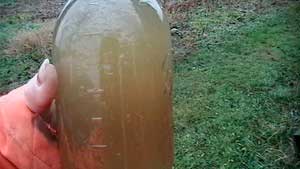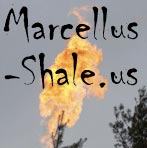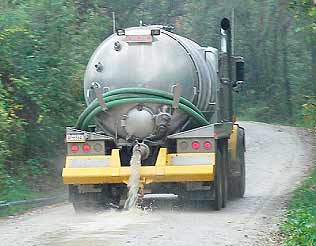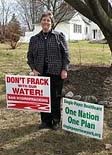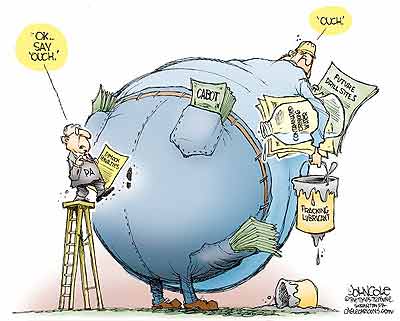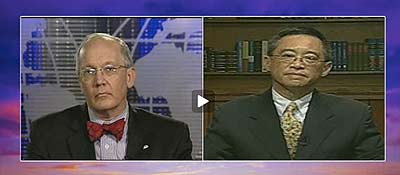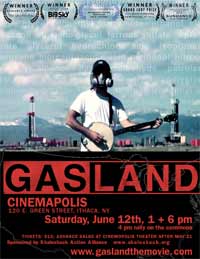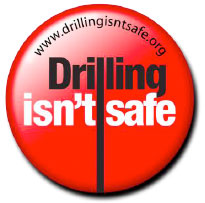Biblio
Since Pennsylvania’s gas drilling boom ramped up in 2008, companies have been fined regularly for environmental accidents — $23,500 here for spilling 5,000 gallons of waste, $15,557 there for spilling 295 gallons of hydrochloric acid. The fines often amount to slaps on the wrist for companies that stand to make hefty profits from their wells.
But the penalties just got a lot more serious for an owner of Kansas-based Swamp Angel Energy and for the company’s site supervisor, who pleaded guilty last week to felony violations of the Safe Drinking Water Act.
As part of a plea agreement with the U.S. attorney for western Pennsylvania, part-owner Michael Evans, 66, of La Quinta, Calif., and John Morgan, 54, of Sheffield, Penn., admitted dumping 200,000 gallons of brine – salty wastewater that’s created in the drilling process – down an abandoned oil well. The maximum penalty for both Evans and Morgan is three years in prison, a fine of $250,000, or both. Sentencing will be June 24. (See follow-up below). Attorneys for both men declined to comment.
Swamp Angel Energy was drilling in the Allegheny National Forest, in McKean County in northwestern Pennsylvania, and the brine was dumped just outside the border of the federal land. In mid-December, a federal judge overturned a ruling that had essentially banned drilling in the Allegheny Forest...
Follow-Up | U.S. EPA Compliance and Enforcement Criminal Case Activities (nz):
EPA's Criminal Enforcement program investigates and helps to prosecute environmental violations which seriously threaten public health and the environment or involve conduct that may be willful, intentional, or deliberate.
Besides environmental violations, the cases may also have associated U.S. criminal code violations such as conspiracy, false statements, witness tampering, or interfering with a law enforcement investigation. Criminal enforcement sanctions -- which may include incarceration of individuals in addition to monetary fines against individuals, businesses, or corporations represent the enforcement program's strongest sanction and deterrent.
John Morgan and Michael Evans (PDF) (1 pg, 32K)
Acting United States Attorney Robert S. Cessar announced today, June 24, 2010, that a resident of Sheffield, Pennsylvania and a resident of La Quinta, California, have been sentenced in federal court in Erie as a result of their felony convictions for violating the Safe Drinking Water Act by unlawfully injecting brine produced from an oil drilling operation.
United States District Judge Sean J. McLaughlin imposed the sentences on John Morgan, age 54, of Sheffield, Pennsylvania, and Michael Evans, age 66, of La Quinta, California. Mr. Morgan received a sentence of three years probation, a $4,000 fine, eight months home detention and eighty hours community service. Mr. Evans received a sentence of three years probation, a $5,000 fine, ten months home detention and one hundred hours community service.
Statement by the National Council of Churches of Christ (2008). A Call for Faithful Stewardship of God’s Creation: Reflections on Natural Gas Drilling and Leasing. National Council of Churches in Christ. Published by Beach Lake United Methodist Church, Beach Lake, PA.
Beach Lake United Methodist Church. Located in Beach Lake, Pennsylvania, near the New York Catskills.
"Biblical and theological considerations are commended to everyone, whether or not they have been approached about a gas lease and regardless of whether they have signed one. People are encouraged to think as broadly as possible and learn all they can in order to make the best possible decisions in the future.
Purpose: To involve church members, wherever in the United States gas drilling is operative or proposed, in biblical and theological dialogue, in order to equip and motivate them to engage in discussions and decisions in their respective communities."
William M. Foster / Auburn AuburnPub.com | Posted: Tuesday, May 17, 2011 3:00 am | (4) Comments
“Call your legislators today and say ‘absolutely not.’ No toxic dump wells in the Finger Lakes!”
William M. Foster
Auburn
Whether you are for it or against it, hydrofracking will significantly alter our way of life, and it’s possible that Gov. Andrew Cuomo will make the decision to the end the current moratorium on June 1. Write or phone — tell him no.
The state Department of Environmental Conservation estimates that natural gas drilling companies will drill 71,000 wells along the southern border of the state from Binghamton to Buffalo and up into the Finger Lakes. To frack one well, it takes on average 4 million gallons of water and 250,000 pounds of chemicals. Each well will be fracked on average six times, which in essence means 24 million gallons of water and 1.5 million pounds of chemicals. When you multiply that by 71,000 wells, the numbers are staggering.
Compounding the issue, gas drilling companies are not required to disclose what they use in the fracking fluids nor are they required to follow any of the federal environmental laws put in place to protect public health and our drinking water.
In Pennsylvania, where hydrofracking is in full swing, state regulators have issued more than 1,400 serious violations in the past two years, including contamination of drinking water and chemical spills.
There’s no reason to doubt the same problems will occur here. Are we expecting our first responders to show up to well blowouts and truck accidents without full knowledge of the hazardous materials involved?
We should all be aware that these companies will be trying to site 10,000 feet deep injection wells to “dump” their toxic waste in just as they have done in other states. It’s too expensive for them to do it any other way. We subsidize them by getting to keep their toxic waste.
Call your legislators today and say “absolutely not.” No toxic dump wells in the Finger Lakes!
Call your state and local legislators and tell them to stop this from happening — now.
In closing, I have used the DEC SGEIS report on hydrofracking as a guide. My family has lived in this community for more than 100 years but I’m not sure that living here with these changes is possible.
William M. Foster
Auburn
Foster is a former member of the Auburn City Council
See: Natural Gas Firms Cited for "Significant Non-Compliance With Auburn Sewer Use Law".
Update
See: Christopher Caskey. "Rally planned against gas well water in Auburn." The Citizen. 2011-05-26.
See: Scott Rapp. "Auburn group hopes protest sways city to stop taking wastewater from natural gas drilling." The Post-Standard. 2011-05-29.
See: Editorial. "Our View: Moratorium, study needed on wastewater." The Citizen. 2011-05-29.
According to the Environmental Working Group, a research and advocacy group based in Washington, drilling companies are side-stepping a permitting requirement for the use of diesel fuel in their fracturing fluids by using similar petroleum distillates that contain the same toxins as diesel, but require no permitting.
The report also cites evidence that drilling companies continue to inject diesel fuel underground without the proper permits.
Includes public comments.
Frac Trucks... some call them soup trucks, kettle trucks or frack trucks. Some of these tanker trailers are used to haul frac sand or cement for gas well casings. Whatever the name or use of these various trucks, they usually catch your attention when they are parked roadside or travelling down the highway as oversize loads.
All kinds of weird plumbing, pipes and gauges not seen in everyday life. Some carry containers of frac fluids or other devices that you never saw anything quite like before. Equipment used for installing and fracking Marcellus Shale gas wells.
Natural gas companies are wasting no time before attempting to sway a Fort Worth air quality study in their favor.
As a City Hall-named committee charged with designing the study began its discussions Wednesday, representatives of Chesapeake Energy, Devon Energy and XTO Energy insisted that any findings of contaminated air around natural gas facilities be examined "in context."
That's how the gas industry's PR machine tries to deflect any blame for poisonous air. The argument goes like this:
Well, yes, benzene causes cancer. And yes, benzene is one of the hazardous chemicals that can be brought to the surface and escape into the air as a result of natural gas drilling and related activities. But measurable levels of benzene can also come from many other sources, like the gasoline station down the street or the road paving project two blocks away. You can't blame it all on us.
That's good spin, just enough truth in it to throw the gullible off guard.
"Read and weep. Here is part of the new brochure: Endless Mountains Visitors Guide. Imagine trying to make a gas well a wonderful and fascinating thing to visit in Pennsylvania. It is almost like trying to make visiting a ward in a VA hospital something to look forward to.
Come see the death and destruction here in Pennsylvania. It will be fascinating. Watch the gas drillers as they work diligently to ruin everything we treasure here in Pennsylvania. Read on.........(from the Endless Mountains Visitors Guide)"
Cartoon by John Cole, The (Scranton) Times-TribuneA boom in natural-gas drilling in Pennsylvania could bring millions of barrels of salty toxic waste into Ohio.
That's a warning Ohio's oil and gas industry and environmentalists are sounding as hundreds of deep wells are drilled into Marcellus shale.
Tom Stewart, vice president of the Ohio Oil and Gas Association, and Jack Shaner, lobbyist for the Ohio Environmental Council, predict that Pennsylvania companies will soon truck their well wastes to Ohio, where brine is injected into 159 privately owned, state-regulated disposal wells. It is illegal to dump brine in Ohio streams and rivers.
Stewart said, "I have a big problem that that (well) capacity isn't overloaded by out-of-state water."
Shaner said, "We're looking at a wave of toxic brine headed into this state."
That's why both support a bill in the Ohio legislature that would create a 20-cent-per-barrel disposal tax on brine shipped in from other states. That's four times as much as a proposed 5-cent-per-barrel tax on Ohio brine.
"Walter, do you believe natural gas can be extracted in an environmentally safe manner?
WALTER HANG: Not under the current regulatory scheme. If they do things better, if they require financial surety, we will find out. But under the existing regs, it cannot be done safely. The data proved that beyond a shadow of a doubt."
Richard Haut is from Houston Advanced Research Center and is an expert on hydrofracking. Walter Hang is President of Toxics Targeting, and provides data to engineers, municipalities and homeowners on possibly contaminated properties.
See: Mixplex articles on Global Warming Experts and Climate Science Watch to read more about the compelling reasons to watchdog government regulation at best and challenge those who claim that peer-reviewed scientific analysis will weaken business development and national security.
The opportunities to have both an educated public and the scientific community comment on the many environmental impact statements required for the mining and extractiive industries is a benefit to both the public and industry according to this report: Pew Environment Group (PEG) Factsheet: Industry Opposition to Government Regulation (PDF), October 14, 2010. (Neil Zusman, 2010-08-28).
See also: Environmental Integrity Project (EIP)
EIP combines research, reporting, and media outreach to spotlight illegal pollution, expose political intimidation of enforcement staff, and encourage federal and state agencies to take enforcement action to stop these practices.
See also: Nora Eisenberg. Onshore Drilling Disasters Waiting to Happen: An Interview With 'Gasland' Director Josh Fox | The Nation
Eisenberg: In your sleuthing, what was the most surprising discovery you made?
Josh Fox: Most baffling to me was how much the gas industry was able to get away with—like [insisting] that drilling is safe. Most people when they sign the lease don't realize that what they're in for is a complete industrialization of their property and an enormous problem with their air and water. The gas industry is somehow able to move into an area and say that everything is going to be just fine, you're just going to make a lot of money.
See: Gasland Trailer
GasLand (2010) Directed by Josh Fox. Winner of Special Jury Prize - Best US Documentary Feature - Sundance 2010. Screening at Cannes 2010. Nominated for 2011 Academy Award - Best Documentary Feature.
It is happening all across America and now in Europe and Africa as well - rural landowners wake up one day to find a lucrative offer from a multinational energy conglomerate wanting to lease their property. The Reason? In America, the company hopes to tap into a huge natural gas reservoir dubbed the Saudi Arabia of natural gas. Halliburton developed a way to get the gas out of the ground—a hydraulic drilling process called fracking—and suddenly America finds itself on the precipice of becoming an energy superpower.
But what comes out of the ground with that natural gas? How does it affect our air and drinking water? GASLAND is a powerful personal documentary that confronts these questions with spirit, strength, and a sense of humor. When filmmaker Josh Fox receives his cash offer in the mail, he travels across 32 states to meet other rural residents on the front lines of fracking. He discovers toxic streams, ruined aquifers, dying livestock, brutal illnesses, and kitchen sinks that burst into flame. He learns that all water is connected and perhaps some things are more valuable than money.
See PBS interview with filmmaker Josh Fox.
See: Nora Eisenberg. Onshore Drilling Disasters Waiting to Happen: An Interview With 'Gasland' Director Josh Fox | The Nation
See: Drilling Isn't Safe.
Re-Edit by liltrax. July 9, 2010.
Playing Dirty
If you have not seen Gasland, take some time to watch it. You can view it on HBO, or purchase from Amazon. The trailer can be seen here: Gasland Trailer.
Now this movie has made its way to the Oscars and as exciting as that is, the Natural Gas Industry is now in full attack form doing whatever it takes to tear this nomination apart.
This works because people that see this movie are touched. They are touched because they have been directly affected by hydraulic fracturing or they want to be a voice for those that have been and don’t want to become a silent statistic as well.
Energy In Depth, a group sponsored by a coalition of natural gas companies, sent a letter to the Academy asking that Gasland — a film about a controversial mining technique called hydro-fracking — be removed from the Documentary Feature category.
It is a good thing that they are reacting so publicly, as they are bringing far more attention to the film and the issue at hand. Josh issued an open letter to the media today, responding to the natural gas industries attempt to slam Gasland. You can read Josh’s letter here on in our Facebook Notes “An Open Letter from Josh Fox.”
Join our communities on Twitter & Facebook and become apart of this conversation, it is one of the most important that you will have.
Azita Ardakani {Founder of Lovesocial}
Edit-Neil Zusman, 2011-02-10
See: Energy in Depth | Mixplex
See: Gasland - The Debate
Will the boom in natural gas drilling contaminate America's water supply?
This week, NOW (PBS) talks with filmmaker Josh Fox about "Gasland", his Sundance award-winning documentary on the surprising consequences of natural gas drilling. Fox's film—inspired when the gas company came to his hometown—alleges chronic illness, animal-killing toxic waste, disastrous explosions, and regulatory missteps.
See: Backlash: The Smear Campaign. Immediately upon the film's release, Energy In Depth issued a paper claiming to "debunk" the film's documentary evidence.
See: Mike Hale. The New York Times. June 21, 2010. The Costs of Natural Gas, Including Flaming Water.
Dave Shiflett. Bloomberg.com. June 21, 2010. Cook a Hamburger and Blow Up Your Polluted Fracking Town.
See: DEC Fracks NYC & Josh Fox of Water Under Attack's Responds
See also: Gasland Trailer 2010.
See: Drilling Isn't Safe.
Gasland is going a long way in spreading public awareness about gas drilling and the risks it poses on human and environmental health. Nationwide response to the film has been overwhelmingly positive. The Oil and Gas Industry's response: not so enthusiastic.
"Energy-In-Depth" is a PR Firm/Lobbying Group funded by the American Petroleum Institute. They are putting a misleading spin on information in Gasland to soothe and silence public curiosity about gas drilling.
The work of Energy-In-Depth lacks journalistic credibility and educated opinion. It's nothing short of an attack on truth. For public interest, we’ve prepared a response to their self-serving claims on gas drilling. Click here to learn more and pass along to friends.
See "Let's Talk About Cleavage", Energy In Depth. August 11, 2010.
Take Action. Adapt the film screening party to ongoing community benefits and information sharing. Download: Gasland HouseParty Guide (PDF) 2010-06-21
See: Mike Hale. NYT Review, "The Costs of Natural Gas, Including Flaming Water".
See: PBS Interview with Josh Fox, March 26, 2010.
See: the Water Portal page on SourceWatch with an excellent summary of the Gasland phenomenon. Robert Koehler of Variety referred to the film as “one of the most effective and expressive environmental films of recent years… "GasLand" may become to the dangers of natural gas drilling what Rachel Carson's "Silent Spring" was to DDT.”
See: Josh Fox Interview with Jon Stewart on The Daily Show.
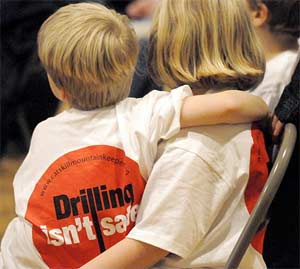
Rhiza Labs | Online Mapping Software for exploring, visualizing, and sharing crowdsourced data on the web.
June 30, 2010
Geo Animation: Marcellus Shale Permits in PA Over Time
by Josh Knauer
Here at Rhiza Labs, we’re really excited to have a whole bunch of new public projects launching with our clients. These clients are pioneers who are exploring new ways to encourage communities of interest to aggregate data and share it publicly, while also providing these communities with incredibly powerful data analysis and visualization tools. One of the latest projects to launch, FracTracker.org, involves many dozens of community organizations that want to tract the impacts of Marcellus Shale gas wells in their communities.
I wanted to see how widespread this type of gas well drilling practice was, so I took the Marcellus Shale gas well permit data from the PA Dept of Environmental Protection and created a quick snapshot of the data, and then just clicked on the Action button in the upper right corner of the snapshot page and chose the options “Download as –> KML” to bring it into Google Earth. I then just hit “play” on the time slider within Google Earth.








